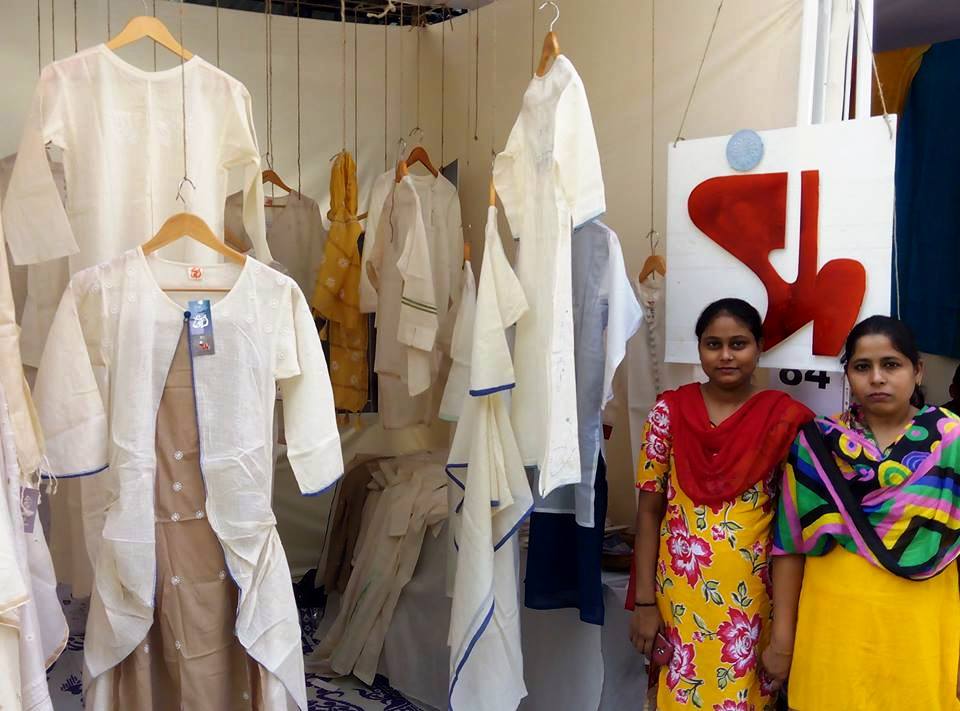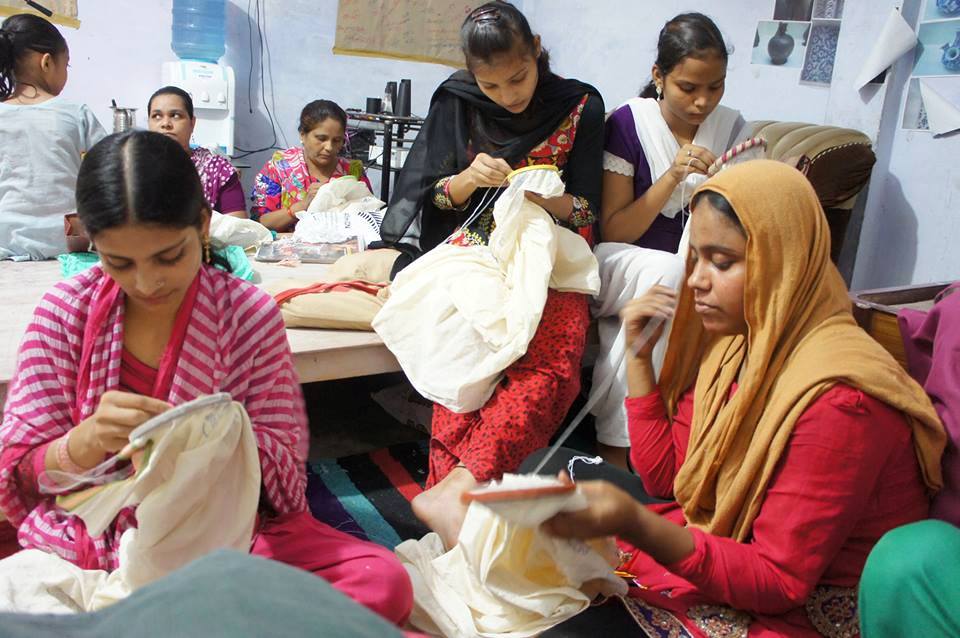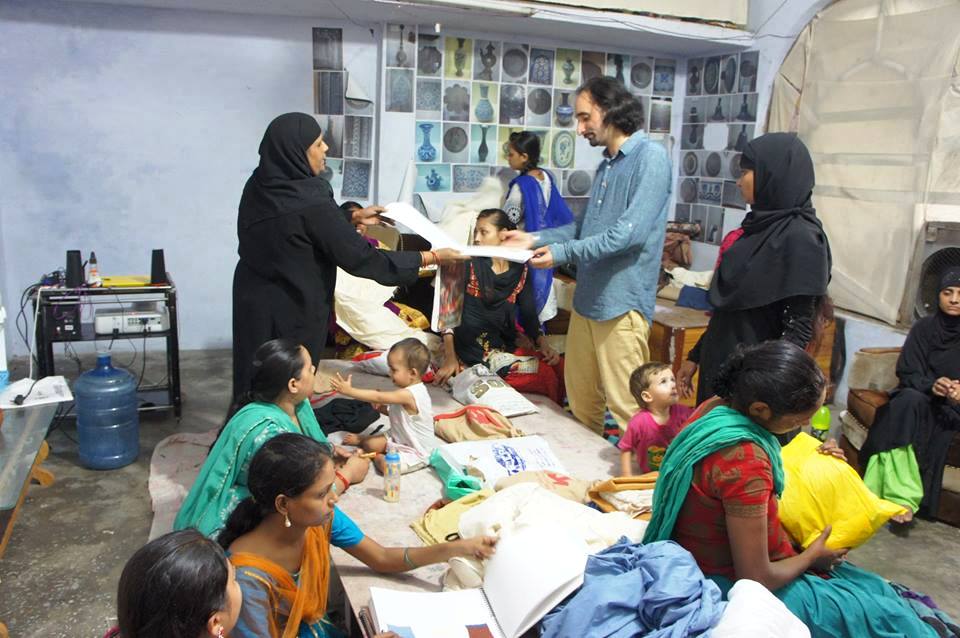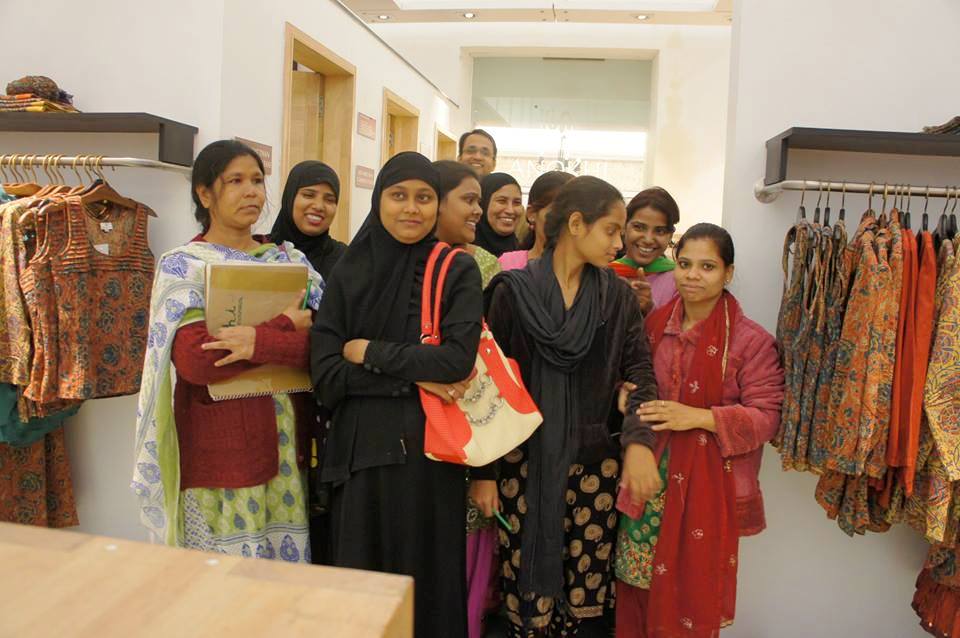Lucknow, UTTAR PRADESH :
About 11 women in Lucknow are establishing their individual identities as chikankari embroidery artisans – all thanks to an organization that not only trained them but also connects them with buyers through an online platform.
Tabassum Khan, 25, and Sheeba Khan, 26, had wanted to apply for a bank loan once. Under the cover of their full-length black burqa, the two made their way to the branch of the nearest bank, criss-crossing through many narrow lanes in Lucknow’s congested Madegunj Khadra neighbourhood.
Encouraged by the recent sale of their embroidered cloth, the two were excited about the possibility of expanding their work and perhaps even striking out on their own. “We wanted money to buy more cloth. We dreamt of having our own wooden frames, more needles and more thread,’ recalls Tabassum. However, after spending a few minutes with the bank official, they promptly dropped the idea of applying for the Rs. 50,000 loan. “He wanted us to come home and told us that his wife was interested in learning embroidery. I felt he did not really mean what he was saying. I could see his actual intentions,” says Sheeba.
Of course, as they made their way back that day, they would have never imagined that they’d eventually be able to realize their dream of becoming artisan-entrepreneurs and selling clothes embellished with exquisite hand-crafted chikankari embroidery.
Today, Tabassum and Sheeba are part of a group of 11 women chikan karigars, who have broken free from the exploitation that is intrinsic to their line of work, to establish their individual identities as artisans.

How did they manage to accomplish this seemingly unimaginable feat? Ask Tabassum and she immediately attributes this positive change to Jaspal Kalra, a professor of fashion design, who set up Sangraha, an organisation that not only conducts a ten-month training programme in design for chikankari artisans, but also connects them with prospective buyers through an online platform, apart from encouraging them to participate in design exhibitions across the country. Essentially, Kalra is a teacher and facilitator while the women take their own decisions regarding the kind of orders they want to take on. They even have a certain freedom to create their own designs, keeping in mind the clients’ needs. For women like Tabassum and Sheena, who would otherwise never get to experience this kind of autonomy in their personal or professional lives, this partnership has indeed been liberating.
Married at 16, Tabassum was back at her parents’ home barely a year later. Disheartened with the way things had unfolded for her – she never went to school, was pushed into early marriage and then had to go through the heartbreak of a broken relationship, all in her teens – she took up chikankari with the intention of supporting herself. She learnt the craft under the guidance of Shilpguru Ayub Khan, who taught her everything she knows about this centuries old technique of embroidery on fine cloth. For years she worked magic with her nimble fingers without receiving any real recognition for her skills. Eventually, though she was conferred with a state award for craftsmanship in 2005, her struggle to earn a decent living continued.
Indeed, awards or not, that’s the lived reality of chikan karigars. In and around Lucknow, chikan embroidery provides employment to about 2,50,000 artisans, mostly women, apart from close to a million people who are associated with the trade, as raw material suppliers, contractors, manufacturers and retailers.
Despite being a thriving sector, it is largely informal, which means that the artisans earn wages from sub-contractor or traders, on a per piece rate. Consequently, their bargaining power is non-existent and the earnings poor.

Both Tabassum and Sheeba have grown up watching the women of their household sit down to embroider after finishing their chores. This was the only way for Muslim women, in particular, to add to their usually unstable family income. Literacy amongst these families is low and poverty is high and they continue to live in conservative neighbourhoods where women are not encouraged to be seen or heard. So, for the want of any other way to make money without having to step out of their home they readily take whatever amount is offered by the contractors.
There was a time when Naima Arshi’s illiterate mother did not know what lay beyond the boundary of her courtyard. “Ironically, poverty liberated me. When I began to earn some money by doing chikan embroidery my husband did not object. How could he? We were so poor. He welcomed the earnings and I used them to educate both my son and daughter. We are still poor but at least Arshi is a university graduate and that gives me great satisfaction,” she says.
Whereas her mother may consider them to be hand-to-mouth even now, Arshi, 28, does not see herself as either poor or deprived.

She’s happy to inform that unlike many girls in her community, she has a bank account. Arshi has followed in her mother’s footsteps in so far as she has taken to doing chikankari for a living. However, her work experiences are very different. Like Tabassum and Sheeba she is attached with Sangraha, an association she greatly cherishes. “Sir has taught us the finer nuances of design and shared the different ways in which we can sell our work. He encourages us to deal directly with customers. While other chikankars get around Rs. 140, at Sangraha we earn Rs. 180 for a day’s work,” says Arshi.
Kalra set up Sangraha in 2015 with an idea to preserve the craft and help artisans gain sustainability and independence. With a mission to empower them with education, market-related services and finance, it started off by providing design education to 11 artisans and encouraging them to participate in various exhibitions in Lucknow and elsewhere, in Delhi, Pune and Jaipur.
“I have been embroidering for as long as I can remember but it is only now that I embroider with a passion I did not know I had,” confesses Tabassum.
Not long ago, she and her fellow ‘karigars’ had travelled to Delhi where customers showered them with praises and orders. At the time, Tabassum informs, she sold embroidered cloth worth more than Rs. 20,000. Mumtaz Jahan, 45, another artisan at Sangraha, happily talks about how she came back from Pune having sold goods worth Rs. 7,000. “All of us came back from exhibitions with loads of orders. We have enough work for the moment and an assured income for several months,” smiles Tabassum, who is a ‘guru’ of sorts to the women. Arshi, Mumtaz and Shabnam acknowledge that they have fine-tuned their stitches under her expert guidance. The women also share that Tabassum is never scared to take up a challenge or to experiment. Fearless and talented, she has a ready wish list, “It’s my dream to own a house, travel around the world with my girl-‘artisan’-friends and would love to see international models walk the runway in Paris clad in clothes designed by me!”
All this will be possible when the women continue to expand the scope of their work and Kalra’s direction will be valuable in this regard.

———-
“The government has introduced schemes for entrepreneurs but I have yet to explore how these can assist the artisans associated with Sangraha. As I see it now, Make In India is more technology oriented and Stand Up India is targeted at women and SC/ST communities. Essentially, the core problem with many such schemes usually is that they don’t have any provisions for creating market linkages and simply stress on giving loans. And the lack of education and an understanding of the market trends expose the artisan to exploitation at the hands of buyers and customers,” he shares.
Dreaming big and having serious ambitions is never really an option for most women chikan karigars, but this lot has definitely moved on from the days of being exploited to being the masters of their designs and destinies.
Written by Mehru Jaffer for Women’s Feature Service (WFS) and republished here in arrangement with WFS.








